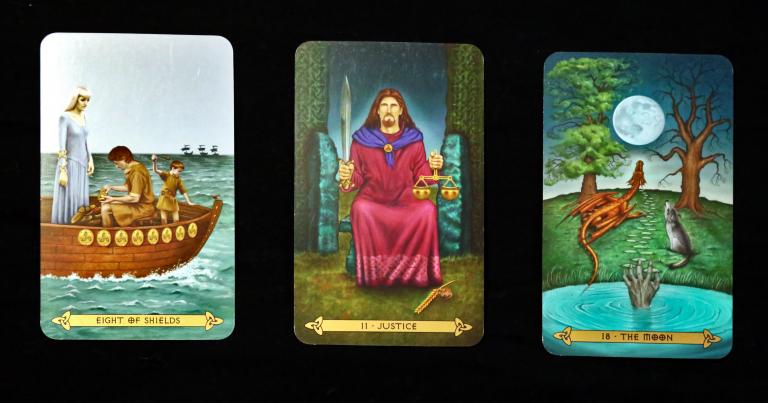The final module of the Under the Ancient Oaks class on Operative Magic was this week. It’s the most popular class I’ve taught so far, and honestly, it’s my favorite. I’ve enjoyed reviewing the homework and seeing how people are not just learning magical theory, they’re also putting magic to use to make their lives better.
One of the things I’ve emphasized is the need to set clear, tangible targets for magical workings. In any situation, defining the problem goes a long way toward solving the problem. Usually the hardest part of magic is figuring out what to work magic for. Like Jack Sparrow and his very special compass, figuring out what you want most is one of the most difficult parts of life.
Most of the students understood this – if they didn’t know it already they learned it in the class. But perhaps 20% of the class wrote target statements that were well-intended but too vague, general, or high-level for magic to work well. Nobody tried to work magic for world peace, but a couple people wanted magic for justice in one form or another, and quite a few wanted things like personal growth and depth.
As I told everyone at the beginning of the class, you want what you want. Unless what you want is to enslave the world, I’m not going to judge your desires. The fact that what you want can’t be turned into a precise target statement doesn’t mean you want it any less.
What do you do when all you have is a dream?
My own story
I’ve told this story before in other contexts, so I’ll be brief. I was pretty miserable in my 20s and early 30s. Part of this was being in some difficult situations (especially my job from hell), but much of it was because I didn’t know what would make me happy. All I could come up with was that I wanted to be “successful.” And while I knew that success involved more than making a lot of money, I couldn’t get past the idea that success had to be achieved through my paying job.
I rather stumbled into this life I have now. I worked to escape fundamentalism because it was adding to my misery. I discovered Paganism, dabbled for a while, had an epiphany, then begin to practice in depth because I wanted to learn. I joined Denton CUUPS because I needed a group to practice with. I started commenting on the now-defunct Dallas Morning News Religion Blog, then started my own blog, then began teaching at festivals and conferences. Now I’ve got two books and three online classes (so far). And I’m still working my “day job” to pay the bills.
Am I successful? That’s not a term I’d use to describe my life. But I’m happy with my life in a way I could only dream about 30 years ago.
Dreams get us started
To be clear, when I say “dreams” I’m talking about grand but vague desires and visions, not the dreams you have when you’re sleeping. Those are also of value, but they’re not what I’m talking about here.
We start with a desire, which is usually vague. We want something good to come into our lives, or we want something bad gone. Desire becomes a dream, where we start to imagine what life would be like if we attained our desire. The dream may be unrealistic or even impossible, but we want what we want. Dreams become visions, where we add more details and qualifications.
This is where will comes into play. Do we have the will to do what must be done to turn the vision into reality? Will isn’t wanting – will is determination and persistence.
Will is how we turn a vision into a goal, a strategy, and a plan. Magic can help us get to where we want to go, but effective magic requires a clear target.
What do you do when you aren’t there yet, when all you have is a dream?
Meditation and divination
No matter the situation, when in doubt meditation and divination are the first places to turn.
Meditation can help us sift through conflicting desires; it can help us separate what we truly want from what we’ve always been told we’re supposed to want. Divination can’t tell us what we want, but it can show us what things will be like if we follow a certain path.
Even if we don’t end up with a clear and tangible target, meditation and divination can help us narrow down our options. It may not show us the exact path we need, but it can point us in the right direction.
And when all you’ve got is a dream, a direction is a very good start.

What will you need when you get there?
If you have a dream, you have some idea of what’s involved. And if you’ve got that you can take a pretty good guess of what you’ll need to do and be once you’re there. So start working on this – build your skills.
When I finally got serious about following this Pagan path, I knew I needed some formal training – and I knew I wanted it in Druidry. I did some investigation and then signed up for the OBOD coursework. Today, most of my practice is outside of an OBOD context, but what I learned in the Bard, Ovate, and Druid training remains valuable.
Training often has to be specific to a path, but education can be helpful in many contexts. Read books and study. If there are skills you’ll need, find a way to learn them – and then practice them. Make connections – in the human world and in the other-than-human world.
Doing the things you’ll do – or that you think you’ll do – when you manifest your dream not only builds useful skills, it helps you try the dream on for size. Because if you don’t like what you’ll be doing when you get there, you may be chasing someone else’s dream.
What will help you get there?
If you want certain jobs in the ordinary world, you’re going to need a college degree. There are numerous problems with the way our society uses a bachelor’s degree as gatekeeping, but for now, it is what it is and having a degree – any degree – is far better than no degree. The sooner you start, the sooner you’ll finish.
If your dream is to climb mountains, you’re going to need an incredible amount of physical fitness – and more than a little money. The sooner you get started on those, the sooner you’ll be able to tackle the world’s highest peaks. And until you get there, climbing mountains that are lower, easier, and closer to you (and thus less expensive to climb) helps get you ready for the Alps and the Himalayas.
And don’t forget regular spiritual practice. That will help you achieve any goal, whether magical, spiritual, or mundane.
Take the first step in the direction of your dream
The main thing is to not let a lack of perfect knowledge keep you sitting on the couch. If you wait until you have a detailed plan you may be waiting all your life. Start moving in the general direction of your dream. Every step you take gets you that much closer to your dream, and it also lets you see what your dream will look and feel like when you get there. That lets you think about whether it’s something you really want, or if you’re chasing someone else’s dreams.
I like detailed plans, and I’ll be the first person to warn you about the dangers of taking off on some great quest without adequate preparations – remember the Donner Party. But too much caution also carries risks, because many opportunities have expiration dates.
Review, revise, and repeat
Heading off in a general direction can be a good and necessary thing. It can also be a dangerous thing. If you’ve done orienteering or open water navigation you know first-hand that if your direction is off by just a few degrees at the start, the further you go the further you get from the most direct route.
If you’re not mindful, you can end up distracted from your dream. Or you can end up settling for something that’s better than what you had but ultimately not what you want.
On a regular basis, stop and review where you’ve been, how you’re doing, and whether you’re still headed in the right direction. Or if you even want to chase this dream anymore. It’s OK to make mistakes. The trick is to catch your mistakes early, learn from them, and make course corrections as soon as possible.
Where’s the magic in all this?
Does all this sound rather mundane? Perhaps, but consider that you may be seriously limiting yourself if you’re expecting magic to do all the heavy lifting. As Jason Miller sometimes says, make a plan that doesn’t require magic to work, then use magic to enhance the odds that it will work.
The best plans and projects I’ve had have started with a dream. The dream became a vision and the vision became a plan… though often, a very tentative plan. Then with a combination of mundane work and magical workings, I moved closer and closer to the goal until either I reached it, or I realized I really wanted something else and I needed to change direction.
If you really want to change the world
This post has focused primarily on things you want for yourself. But what if what you want most is to change the world – what if your deepest desire really is world peace.
I don’t have any easy answers. There is no magic that will change the world all at once, and while I’m very sympathetic with them I’m leery of mass workings. Projects like Laura Tempest Zakroff’s Quintisigil can help, but they’re best when – like the Quintisigil – they’re used to support mundane action. But the process is the same: figure out what you want, do what will help you get there, do something rather than nothing, and make course corrections as you go.
We are magical people, but mainly we’re human. Our power and wisdom are limited. Despite our best intentions and best preparations we will always make mistakes. But still, we can do great things. We just have to start somewhere.

















